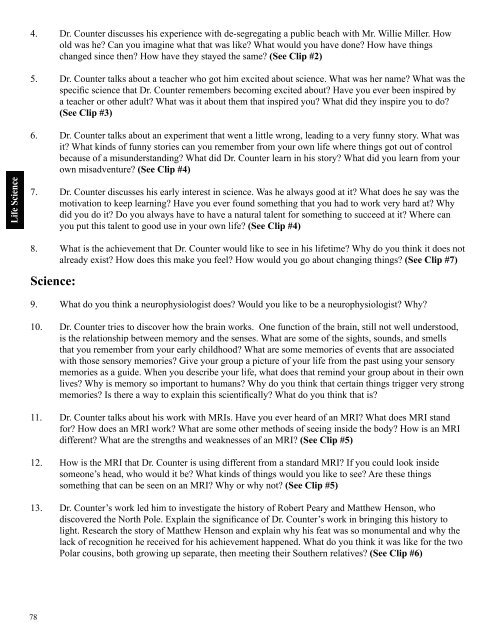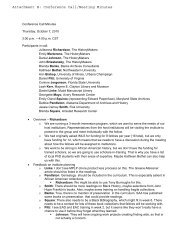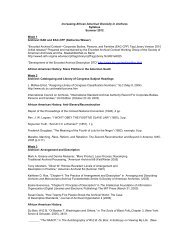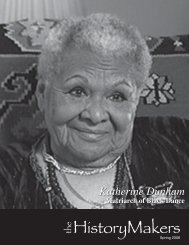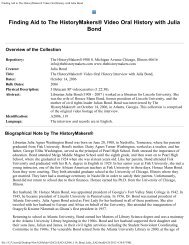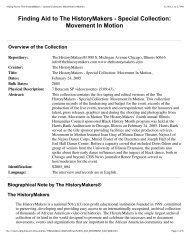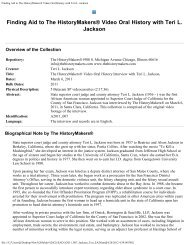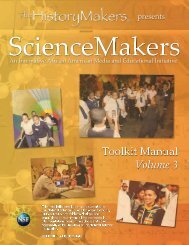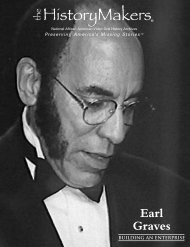ScienceMakers Toolkit Manual - The History Makers
ScienceMakers Toolkit Manual - The History Makers
ScienceMakers Toolkit Manual - The History Makers
You also want an ePaper? Increase the reach of your titles
YUMPU automatically turns print PDFs into web optimized ePapers that Google loves.
Life Science<br />
4. Dr. Counter discusses his experience with de-segregating a public beach with Mr. Willie Miller. How<br />
old was he? Can you imagine what that was like? What would you have done? How have things<br />
changed since then? How have they stayed the same? (See Clip #2)<br />
5. Dr. Counter talks about a teacher who got him excited about science. What was her name? What was the<br />
specifi c science that Dr. Counter remembers becoming excited about? Have you ever been inspired by<br />
a teacher or other adult? What was it about them that inspired you? What did they inspire you to do?<br />
(See Clip #3)<br />
6. Dr. Counter talks about an experiment that went a little wrong, leading to a very funny story. What was<br />
it? What kinds of funny stories can you remember from your own life where things got out of control<br />
because of a misunderstanding? What did Dr. Counter learn in his story? What did you learn from your<br />
own misadventure? (See Clip #4)<br />
7. Dr. Counter discusses his early interest in science. Was he always good at it? What does he say was the<br />
motivation to keep learning? Have you ever found something that you had to work very hard at? Why<br />
did you do it? Do you always have to have a natural talent for something to succeed at it? Where can<br />
you put this talent to good use in your own life? (See Clip #4)<br />
8. What is the achievement that Dr. Counter would like to see in his lifetime? Why do you think it does not<br />
already exist? How does this make you feel? How would you go about changing things? (See Clip #7)<br />
Science:<br />
9. What do you think a neurophysiologist does? Would you like to be a neurophysiologist? Why?<br />
10. Dr. Counter tries to discover how the brain works. One function of the brain, still not well understood,<br />
is the relationship between memory and the senses. What are some of the sights, sounds, and smells<br />
that you remember from your early childhood? What are some memories of events that are associated<br />
with those sensory memories? Give your group a picture of your life from the past using your sensory<br />
memories as a guide. When you describe your life, what does that remind your group about in their own<br />
lives? Why is memory so important to humans? Why do you think that certain things trigger very strong<br />
memories? Is there a way to explain this scientifi cally? What do you think that is?<br />
11. Dr. Counter talks about his work with MRIs. Have you ever heard of an MRI? What does MRI stand<br />
for? How does an MRI work? What are some other methods of seeing inside the body? How is an MRI<br />
different? What are the strengths and weaknesses of an MRI? (See Clip #5)<br />
12. How is the MRI that Dr. Counter is using different from a standard MRI? If you could look inside<br />
someone’s head, who would it be? What kinds of things would you like to see? Are these things<br />
something that can be seen on an MRI? Why or why not? (See Clip #5)<br />
13. Dr. Counter’s work led him to investigate the history of Robert Peary and Matthew Henson, who<br />
discovered the North Pole. Explain the signifi cance of Dr. Counter’s work in bringing this history to<br />
light. Research the story of Matthew Henson and explain why his feat was so monumental and why the<br />
lack of recognition he received for his achievement happened. What do you think it was like for the two<br />
Polar cousins, both growing up separate, then meeting their Southern relatives? (See Clip #6)<br />
78


